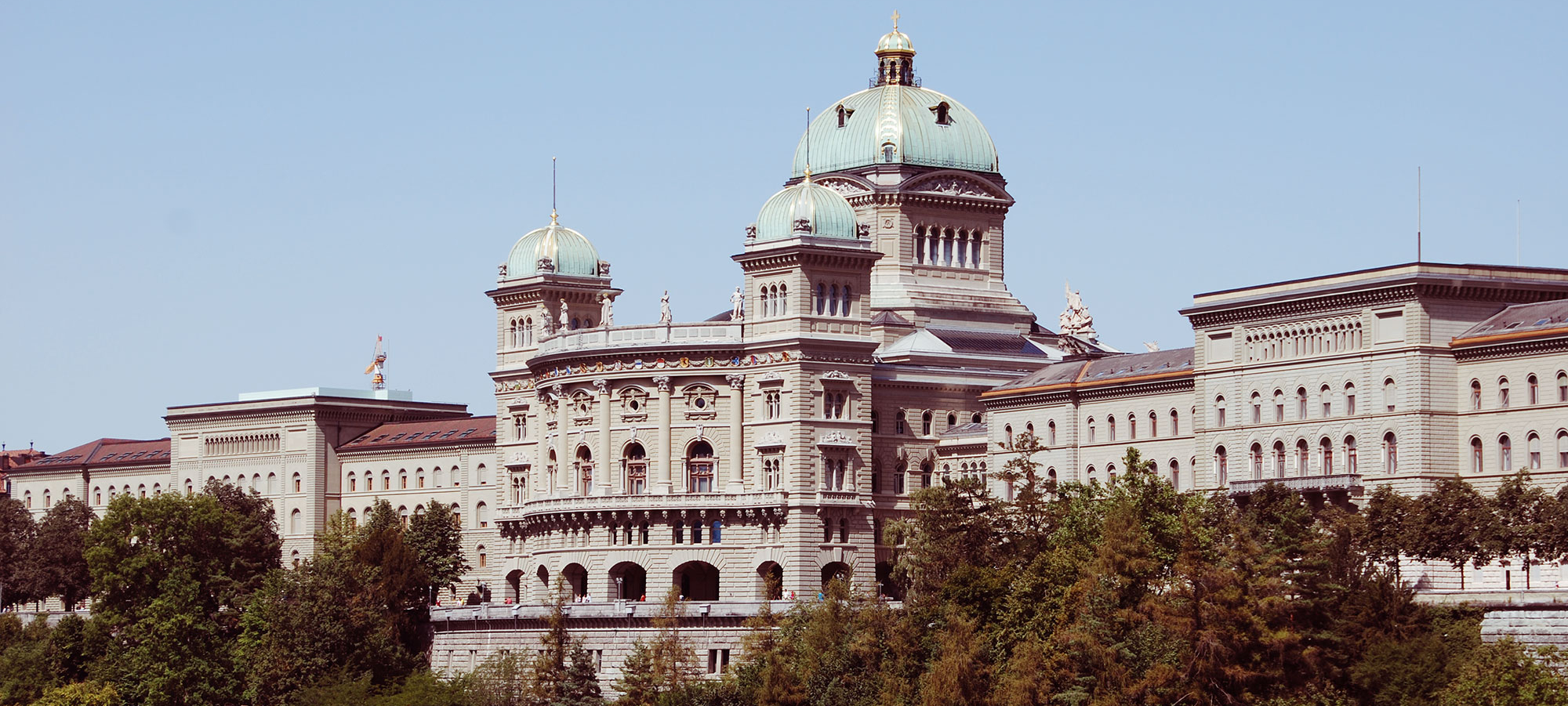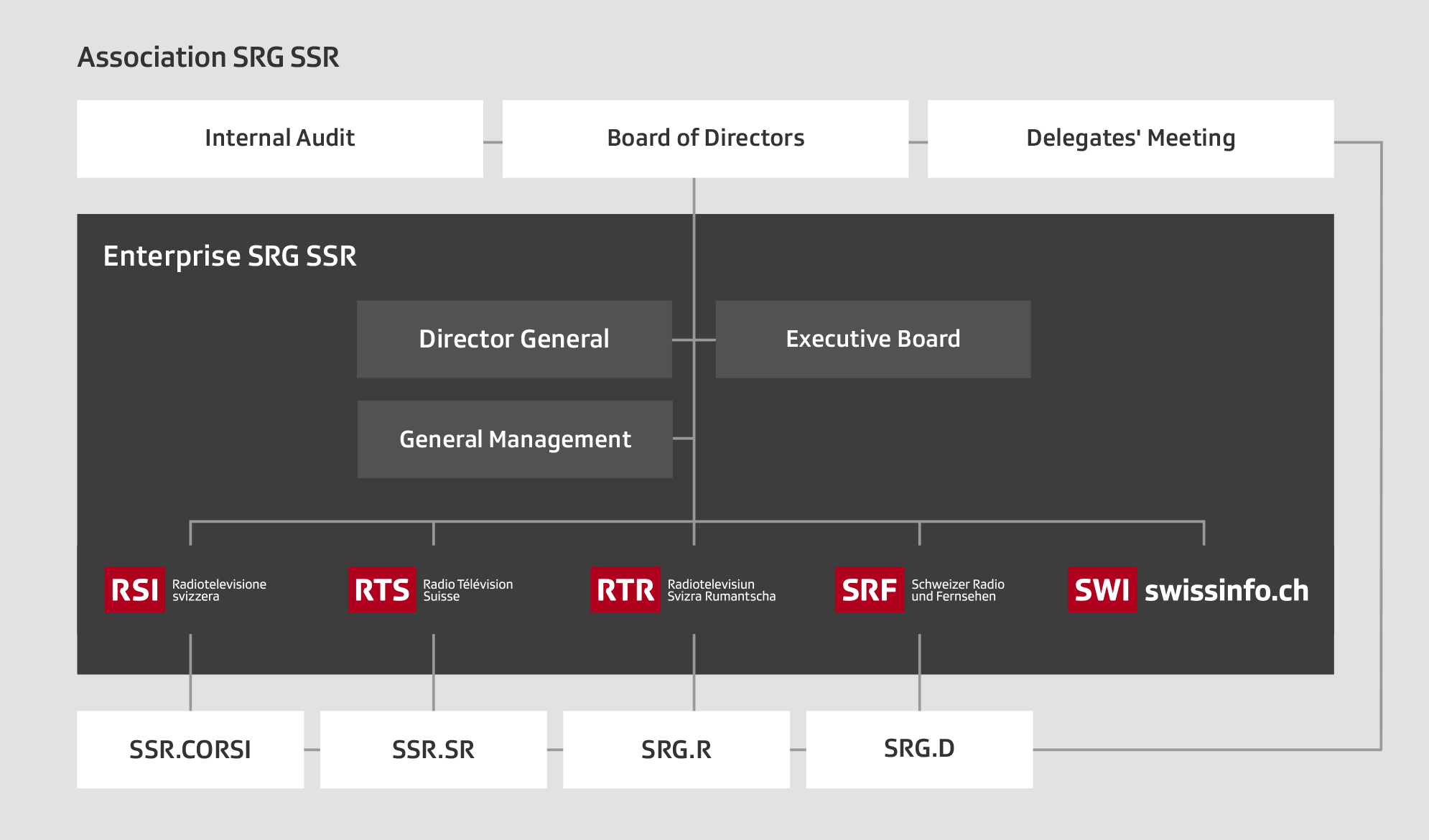Political framework and mission
SRG SSR is sometimes referred to as a state-owned enterprise, but the truth is that SRG SSR is actually a private association run in accordance with company law and, by means of a company, creates and provides publicly financed media content and services for the whole of Switzerland. As such, SRG SSR receives funds raised from revenue obtained from radio and television fees and a politically defined mission. Given that SRG SSR is a public media organisation, politics and policies are of pivotal importance. The Public Affairs department is in constant contact with the relevant political stakeholders and represents the interests of SRG SSR and public service media in political processes.
SRG SSR – embedded in the general political framework
Political figures shape SRG SSR’s general framework: by means of the wording of the Swiss Federal Constitution, the legal foundations, the corresponding ordinances and the SRG SSR charter. Within that framework, SRG SSR is given independence both from an organisational perspective and in terms of its programmes, and SRG SSR’s editorial work is neutral and impartial.
Swiss Federal Constitution
Article 93 of the Swiss Federal Constitution, entitled “Radio and Television”, forms the constitutional basis for SRG SSR’s activities. That article states that the Confederation is responsible for legislation on radio and television as well as on other forms of public broadcasting. Radio and television should contribute to education and cultural development, to the free shaping of opinion and to entertainment, take account of the particularities of the country and the needs of the Cantons, present events accurately and reflect a diversity of opinions. The Swiss Federal Constitution must also guarantee the independence of radio and television as well as their autonomy in deciding on programming.
SRG SSR’s constitutional basis was recently democratically affirmed by the Swiss electorate at the time of the “No Billag” initiative, which proposed abolishing the licence fee for public service radio and television, following intense social debate regarding public service media with 71.2% of people voting to keep the fee, whereby the very youngest group of voters (those aged between 18 and 29 years old) came out most strongly in favour of it.
Legal act and ordinance
The Swiss Federal Act on Radio and Television (RTVA) sets out SRG SSR’s constitutional performance mandate in more detail and contains provisions on the implementation of the programme service mandate, on the transmission of programme services and on SRG SSR’s organisation and finance.
These include:
- the organisational structure (for example the composition of the Board of Directors)
- the use of financial resources
- financial supervision by the Swiss Federal Department of the Environment, Transport, Energy and Communications (DETEC)
- cooperation with certain sectors (film, music, archive, etc.)
SRG SSR must be cost-effectively managed and be organised in such a way as to guarantee its autonomy and independence. The way in which it is run must ensure that the concerns of the linguistic regions are taken into consideration and the public is represented in the organisation. The wording of the legal act is the responsibility of parliament and the ordinance is defined by the Swiss Federal Council.
Charter
The public service mandate is set out in further details in our charter, which is granted for several years at a time by the Swiss Federal Council. The charter
- sets out principles and core values (public service obligations, acceptance, quality, dialogue with the public);
- defines crossover tasks in the areas of innovation, cultural exchange, content and services for young target groups, people from migrant backgrounds and people with sensory disabilities;
- specifies the journalistic services in the areas of information, culture, education, entertainment and sport. These are similar in size in the three large linguistic regions and are adapted for Romansh-speaking Switzerland. Swiss people living abroad have access to online content and services;
- sets out specifications regarding production, regarding the broadcasting of programmes on the radio, on the television and on the Internet, and regarding online content and services (for example, text-only articles without any connection to a programme in the News, Sport and Regional/Local sections are limited to a maximum of 1,000 characters per article);
- states that we differ from commercial providers, including on account of the particular quality and ethical standards that our programmes have to meet;
- sets out specifications regarding SRG SSR’s organisation, its cooperation with other media, organisers and sectors, and its reporting obligations.
SRG’s radio broadcast output:
- Three stations each for the German, French and Italian language regions
Radio SRF 1, Radio SRF 2 Kultur, Radio SRF 3, La Première, Espace 2, Couleur 3, Rete Uno, Rete Due, Rete Tre - One Rhaeto-Romansh station
Radio RTR - One younger listener station for German-speaking Switzerland
Radio SRF Virus - One German-speaking information station
SRF 4 News - One station each for the German and French language regions, which gives a broad platform for folk music culture Radio
SRF Musikwelle, Option Musique - One music station each for classical, jazz and pop for all language regions, with Swiss artists accounting for a share of at least 50 percent
Radio Swiss Classic, Radio Swiss Jazz
SRG’s television broadcast output:
- Two channels each for the German, French and Italian language regions in HD quality
SRF 1, SRF 2, RTS 1, RTS 2, RSI LA 1, RSI LA 2 - Programmes in Rhaeto-Romansh
on SRF 1, SRF info, RTS 1, RSI LA 1, RSI LA 2 - One German-language repeat programme
SRF info - Online television in all language regions, with continuously updated information and programme information without advertising and without sponsorship
SRF Play, RTS Play, RSI Play, RTR Play, SWI Play
Our other editorial services include:
- Online services with an emphasis on audio content and audiovisual content
This includes, for example, srf.ch, rts.ch, rsi.ch, rtr.ch, swi.ch, apps and social media channels. - Teletext
Teletext provides multilingual brief information on the SRF, RTS and RSI stations. It is available on TV, online and via an app. - HbbTV (Hybrid broadcast broadband TV)
HbbTV or Smart TV is a technology that connects digital television with the Internet. Like Teletext, the TV channel offers additional information via HbbTV. In addition, HbbTV provides access to programmes which have already been broadcast, live streams and all SRG SSR radio stations, and contains extended services for people with sensory disabilities, such as configurable subtitles. - journalistic content and services for abroad
The journalistic content and services for abroad comprise: swissinfo.ch – the SRG SSR online platform for the Swiss ex-pat community, French-language programmes on TV5Monde, German-language programmes on 3Sat, as well as Italian-language features on the online platform tvsvizzera.it.
SRG SSR in dialogue with political stakeholders
Politics and policies determine the SRG SSR’s general framework. As such, dialogue with political stakeholders and mutual understanding are of pivotal importance. The Public Affairs department is in constant contact with the relevant political stakeholders and represents the interests of SRG SSR and public service media in political processes.
SRG SSR receives most of its funding from revenue obtained from media fees paid by households and by companies with a certain level of turnover. As such, to a certain extent SRG SSR belongs to the Swiss people – to us all. Numerous stakeholders have a legitimate interest in SRG SSR’s activities and monitor them carefully and, where necessary, with a critical eye. Regular dialogue forms the basis for mutual understanding.
The Swiss Federal Council and the parliament decide on the framework for public service media and are SRG SSR’s main dialogue partners. SRG SSR relies on a solid political framework to be able to fulfil its performance mandate and this will continue to be the case in the future. The Public Affairs department monitors political developments carefully, follows legislative processes in the federal parliament building and makes the interests of public service media known to political decision makers and political stakeholders at national and regional level.

